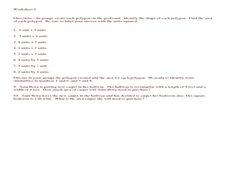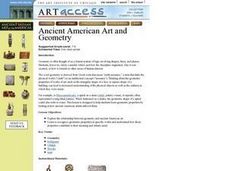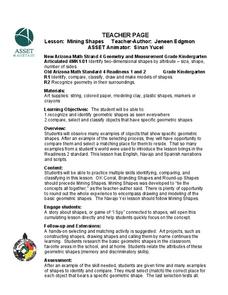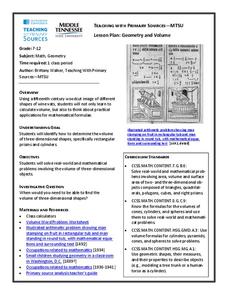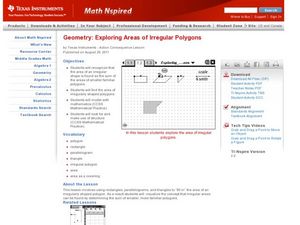Curated OER
Geometry Institute Lesson
Students practice geometry skills. In this geometry lesson, students find the surface area of cubes and prisms, identify shapes on solids, and distinguish between 2-dimensional objects and solids.
Curated OER
Area And Perimeter Powerpoint
Students engage in a study using technology in order to attempt the comprehension of using perimeter and area. They use powerpoint to solve different problems. This helps to keep learners engaged in the process of practice and...
Curated OER
If you have to find the area of a region, how would you calculate it?
Fifth graders find the area of rice farms. In this area instructional activity, 5th graders draw shapes and grid them to find the area. They compare different rice fields to see which one takes up more space and has the larger area.
Curated OER
Length, Perimeter, and Area
Students explore the concepts of length, perimeter and area. Students develop an understanding of length, perimeter, and area. Students calculate the area and perimeter of random shapes and calculate the area and perimeter of a triangle...
Curated OER
Physical Education Meets Geometry
Students create geometric shapes with a jump rope. In this interdisciplinary lesson, students review the different shapes while getting some physical activity.
Curated OER
Effect on Surface Area and Volume
Young scholars identify the effect the change of dimensions causes for the volume and surface area. In this geometry lesson, students compare perimeter, area and volume as they play around with the dimensions of the polygons. They...
Curated OER
Real Life Application of Area and Perimeter
Fifth graders explore real-life situations of area and perimeter. They develop a list of real-life applications of area and perimeter, select a situation, and write a step-by-step procedure and diagram on graph paper for solving the...
Curated OER
Exploring Area and Perimeter
Two students are blindfolded and each receives a cardboard square, one with pompoms glued around the edge and one with pompoms glued all over the surface. They identify what they feel. The class discusses perimeter and area of polygons....
Curated OER
Finding the Area of Regular Polygons
Students analyze relationship between the increase in polygons sides and a circle. In this geometry lesson, students relate the size of the central angle of a polygon, to a circle. They compare the formula for the area of a polygon and a...
Curated OER
Pythagorean Theorem
In this measurement lesson, learners examine the Pythagorean Theorem, perimeter, and areas of right triangles. They record their measurements and research their findings on a grid.
Curated OER
A Rectangular Prism and Its Net
Identify the nets for prisms and other geometric shapes. Learners calculate the surface area of the rectangular prism then sketch the shapes of prisms and other polygons. Unfolded cereal boxes are used as a visual aid, great idea!
Curated OER
How Many Units?
Young mathematicians calculate the area of rectangles and squares. In this geometry lesson, learners are grouped in pairs and use geoboards to construct rectangles. They calculate the area of the figure by counting the number of square...
Curated OER
Complexity Madness
After introducing the concept and formula for finding the area of a square, try this instructional activity. Fifth graders will use their prior knowledge to break apart various shapes in order to determine area. This instructional...
Curated OER
Exploring Area
Tenth graders calculate the area of various shapes. In this geometry lesson, 10th graders use isometric paper to draw shapes. They identify their shapes by name and calculate how many triangles will fit in the area of a shape.
Curated OER
Area-Time to Get in Shape
Students investigate the properties of triangles and parallelograms. In this geometry instructional activity, students calculate the formula used to find the are of a triangle and other polygons. They create a visual model to represent...
Curated OER
Ancient American Art and Geometry
Students explore the relationship between geometry and ancient American art. They see how to recognize geometric properties in specific works and explain how these properties contribute to their meaning and artistic merit.
Arizona State University
Mining Shapes
Youngsters recognize and identify shapes. They draw, and use modeling clay to make shapes. They also identify shapes in their environment and in the Navajo culture, then compare the shapes and sort them into groups. This is the...
PBS
Surface Area and Volume
You and your class will like this lesson on using visual models to relate the volume and surface area of solid shapes. Learners construct three-dimensional forms using nets. They calculate the surface area and volume for each and then...
Virginia Department of Education
Geometry and Volume
The history of math is fascinating! Utilize a woodcut primary source image from 1492 and posters from the 1930s to help geometers apply their volume-calculation skills to real-life questions.
Curated OER
Tantalizing Tangrams
Students explore "area." In this tangram geometry and measurement lesson plan, students arrange tangram pieces to find the area of characters presented in a story they listen to on a website. Website information and related...
Curated OER
Lesson 9-3 Practice B: Composite Figures
In this composite figures worksheet, students solve 11 short answer problems. Students find the area of figures composed of various polygons. Students find the area of each figure given a sketch of the figure with various measurements...
Curated OER
What a Square
Students examine the painting "Old Man With A Gold Chain" by Rembrandt. They identify geometric shapes in the painting, measure these shapes and compare the relationships of these measurements.
Curated OER
Exploring Areas of Irregular Polygons
Students solve for the area of different polygons. For this geometry lesson, students identify and differentiate between regular and irregular polygons. They use properties of irregular polygons to solve problems.
Curated OER
Areas of Polygons
Students calculate the are of regular polygons. In this geometry lesson, students create polygons on the computer and move it around to create different shapes. They explore the area of different polygons and how they inter-relate.











